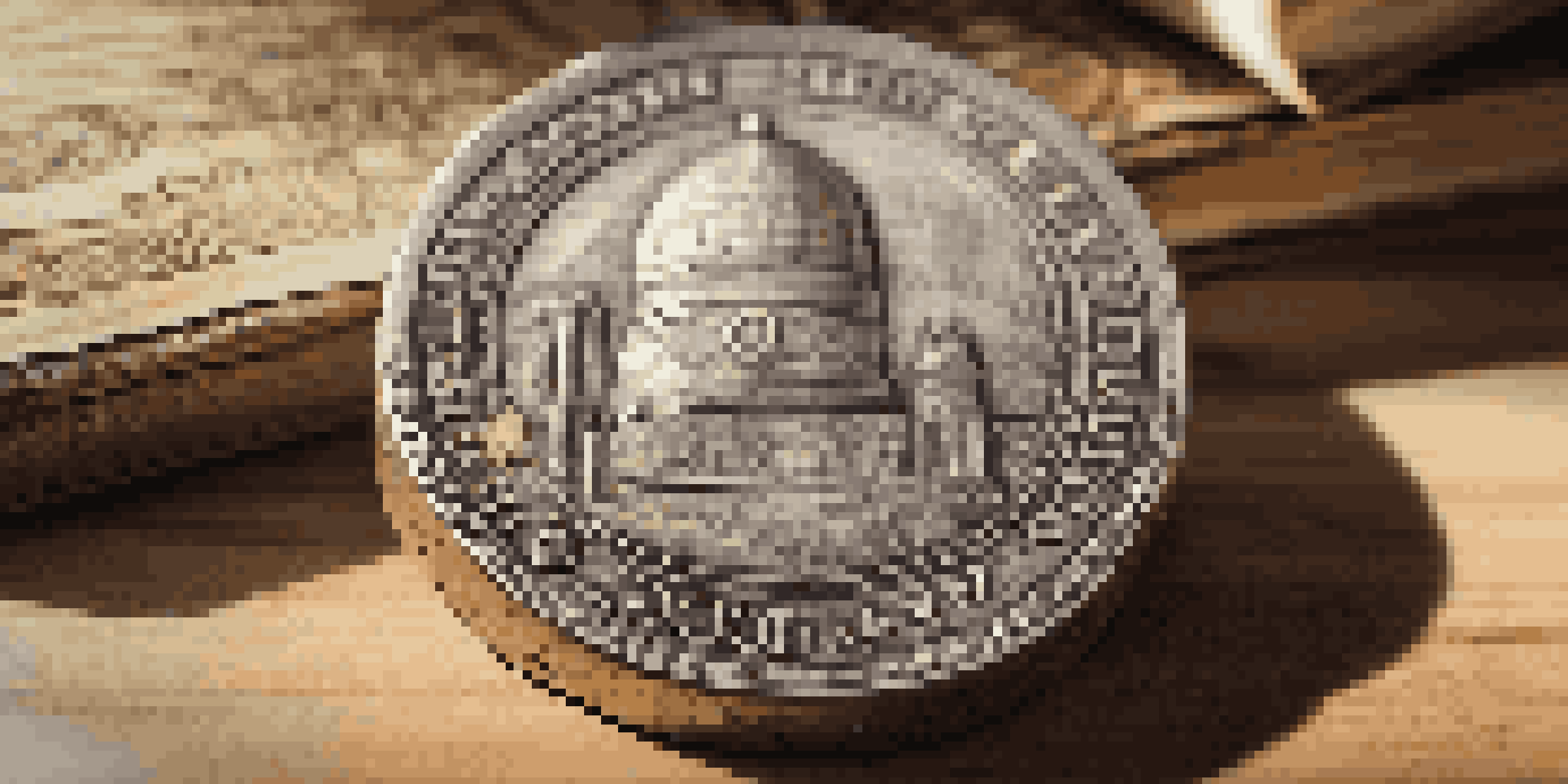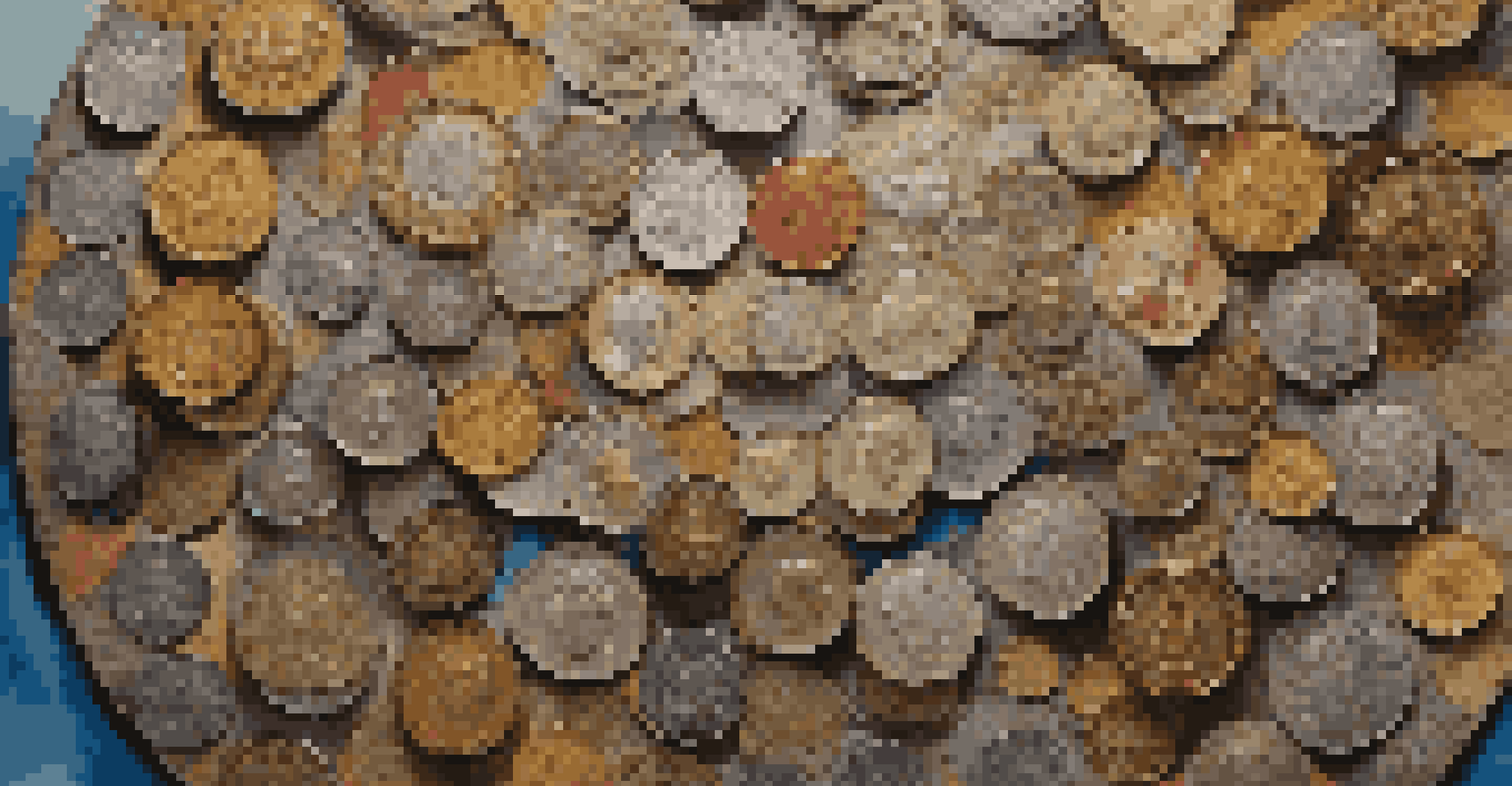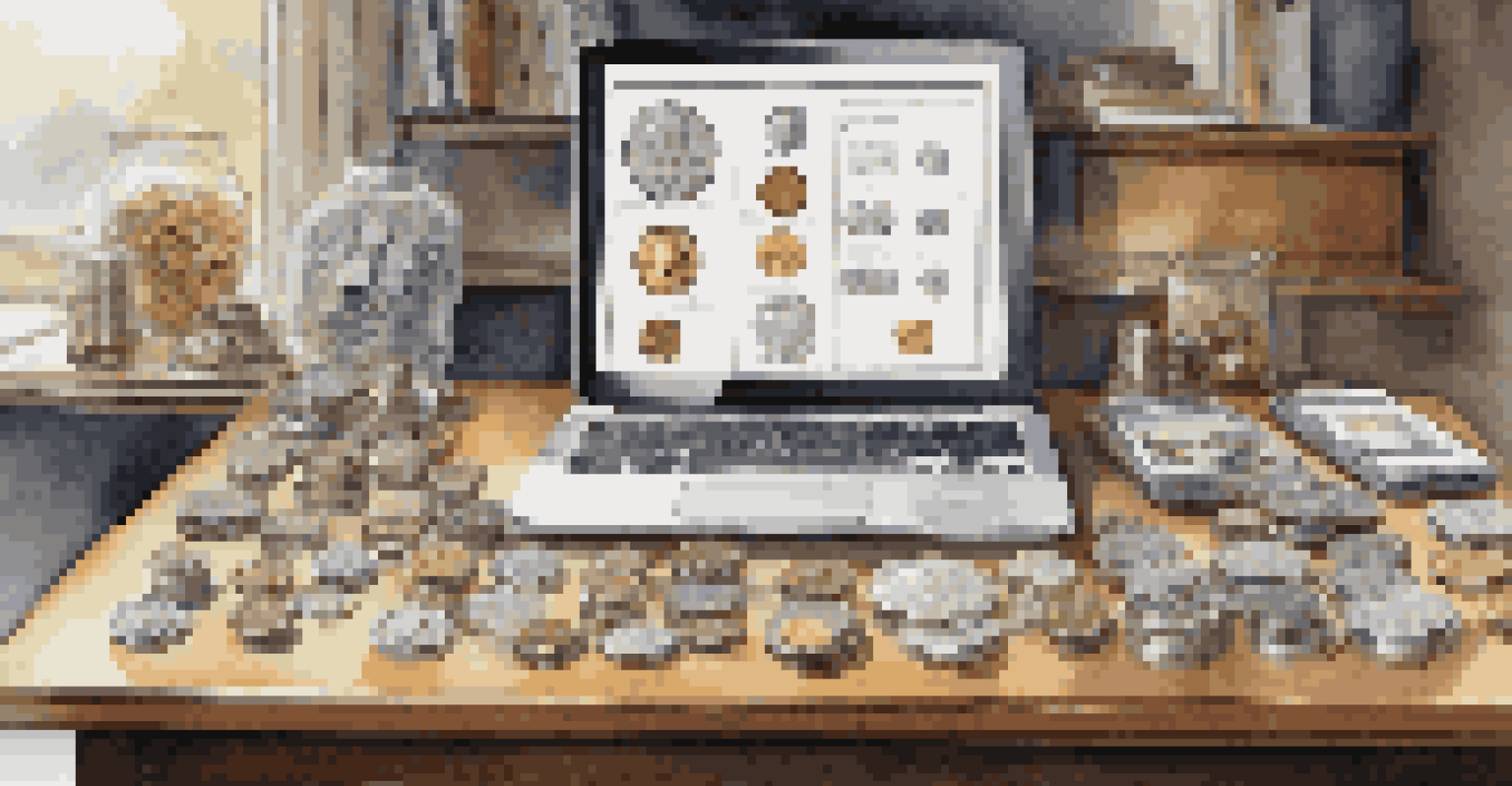Exploring the Role of Coin Collecting in Cultural Heritage

The Fascinating History Behind Coin Collecting
Coin collecting, also known as numismatics, has roots that stretch back thousands of years. From ancient civilizations using coins to facilitate trade to modern collectors seeking rare pieces, the practice has evolved significantly. Each coin tells a story, reflecting the culture, economy, and artistry of its time, making it a window into history.
Coins are a historical record of human civilization, reflecting the changing dynamics of society over time.
For instance, coins from the Roman Empire not only served as currency but also featured the likenesses of emperors, commemorative events, and even deities. This practice helped to solidify the emperor's image in the public's mind, intertwining economics with cultural identity. As a result, coin collecting becomes more than just a hobby; it transforms into a way to engage with history.
Today, collectors often seek coins that represent different cultures and eras, enriching their understanding of the world. This passion for collecting can foster a deeper appreciation for the intricate tapestry of human experience, making it a vital aspect of cultural heritage.
The Significance of Coins in Cultural Narratives
Coins are not merely objects; they are artifacts that encapsulate the narratives of civilizations. Each coin can reveal insights about the social hierarchies, political systems, and economic practices of the time. For instance, the introduction of coins in ancient Greece marked a shift towards more sophisticated trade practices, emphasizing the importance of commerce in cultural development.

Moreover, coins often celebrate important milestones, such as the founding of cities or the reign of notable leaders. For example, commemorative coins from various countries often highlight significant historical events, offering a tangible connection to those moments. This aspect of coinage makes it an essential part of preserving cultural stories.
Coins as Cultural Narratives
Coins encapsulate the stories of civilizations, revealing insights into social hierarchies, political systems, and economic practices.
By studying these coins, collectors and historians alike can piece together the rich tapestry of our shared human heritage. In this way, coin collecting serves as a vital tool for education and cultural preservation.
How Coin Collecting Promotes Cultural Awareness
Coin collecting can act as a bridge to cultural understanding, sparking interest in diverse histories. Collectors often delve into the background of their coins, learning about the societies that produced them. This journey fosters a sense of connection to cultures that may seem distant or unfamiliar.
The study of coins is a gateway to understanding the past, revealing the stories of cultures and economies.
For instance, a collector who acquires coins from ancient China might find themselves drawn to the philosophies, art, and traditions of that civilization. This newfound knowledge can inspire a deeper appreciation for cultural diversity and the complexities that shape human societies. In essence, coin collecting transforms mere objects into gateways to understanding.
As collectors share their findings with others, they help spread awareness of different cultures and histories. This sharing creates a community of enthusiasts who celebrate diversity and promote mutual respect, reinforcing the idea that every culture has its unique story worth telling.
The Role of Museums in Coin Conservation
Museums play a crucial role in preserving coins and the cultural heritage they represent. By housing collections of historical coins, museums provide the public with access to these treasures, facilitating education and research. This function is vital, as it allows for the preservation of artifacts that might otherwise be lost or forgotten.
In addition to conservation, museums also curate exhibitions that highlight the significance of coins within different cultures. These exhibits can inspire visitors to explore the stories behind the coins, fostering a deeper understanding of history and heritage. When people engage with coins in a museum setting, it often sparks curiosity about their own cultural backgrounds.
Coin Collecting Fosters Awareness
The hobby of coin collecting promotes cultural understanding by connecting collectors with the histories of diverse societies.
Furthermore, museums often collaborate with collectors and numismatic societies to expand their collections and knowledge base. This partnership not only enriches the museum's offerings but also enhances the collector's experience, creating a shared commitment to preserving cultural heritage through coins.
Challenges in Coin Preservation and Authenticity
While coin collecting is a fascinating pursuit, it comes with challenges, particularly in terms of preservation and authenticity. Coins can be susceptible to damage from environmental factors, such as moisture and temperature fluctuations. Proper storage techniques, such as using acid-free holders and climate-controlled environments, are essential for maintaining their condition.
Authenticity is another critical issue, as counterfeit coins can easily infiltrate the market. Collectors must educate themselves on distinguishing genuine coins from fakes, which often requires experience and research. This aspect of collecting emphasizes the importance of community knowledge-sharing and resources, as seasoned collectors can provide valuable insights.
Addressing these challenges not only helps collectors protect their investments but also ensures the cultural significance of the coins remains intact. By prioritizing preservation and authenticity, collectors can contribute to the ongoing legacy of cultural heritage.
The Intersection of Technology and Coin Collecting
In today's digital age, technology has transformed the world of coin collecting. Online marketplaces and auction sites allow collectors to buy, sell, and trade coins with unprecedented ease. This accessibility has not only expanded the collector base but also facilitated global connections among enthusiasts.
Moreover, digital tools enable collectors to catalog their collections efficiently, track values, and engage with fellow numismatists through forums and social media. This increased connectivity fosters a sense of community, where collectors can share their passion and knowledge. For instance, many collectors now utilize apps that provide information on coin values and historical contexts.
Technology's Role in Coin Collecting
Advancements in technology have transformed coin collecting, enhancing accessibility, community engagement, and preservation efforts.
Additionally, technology plays a significant role in preserving coins for future generations. Advanced imaging techniques allow for detailed documentation of coins, ensuring that their history and artistry are not lost over time. By embracing technology, coin collectors can enhance their experiences while contributing to the preservation of cultural heritage.
The Future of Coin Collecting and Cultural Heritage
As we look to the future, the importance of coin collecting in preserving cultural heritage is more relevant than ever. With globalization and rapid technological advancements, the ways we connect with different cultures continue to evolve. Coin collecting provides a tangible means to explore and appreciate these diverse histories.
Future collectors may increasingly focus on coins that reflect contemporary issues, such as social justice or environmental concerns, bridging the past and present in meaningful ways. This evolution in collecting not only enriches the hobby but also encourages collectors to reflect on their own cultural identities and values.

Ultimately, the future of coin collecting lies in its ability to adapt and remain relevant. By fostering a deeper understanding of our shared heritage, coin collectors can play a vital role in celebrating cultural diversity and preserving the stories that unite us all.